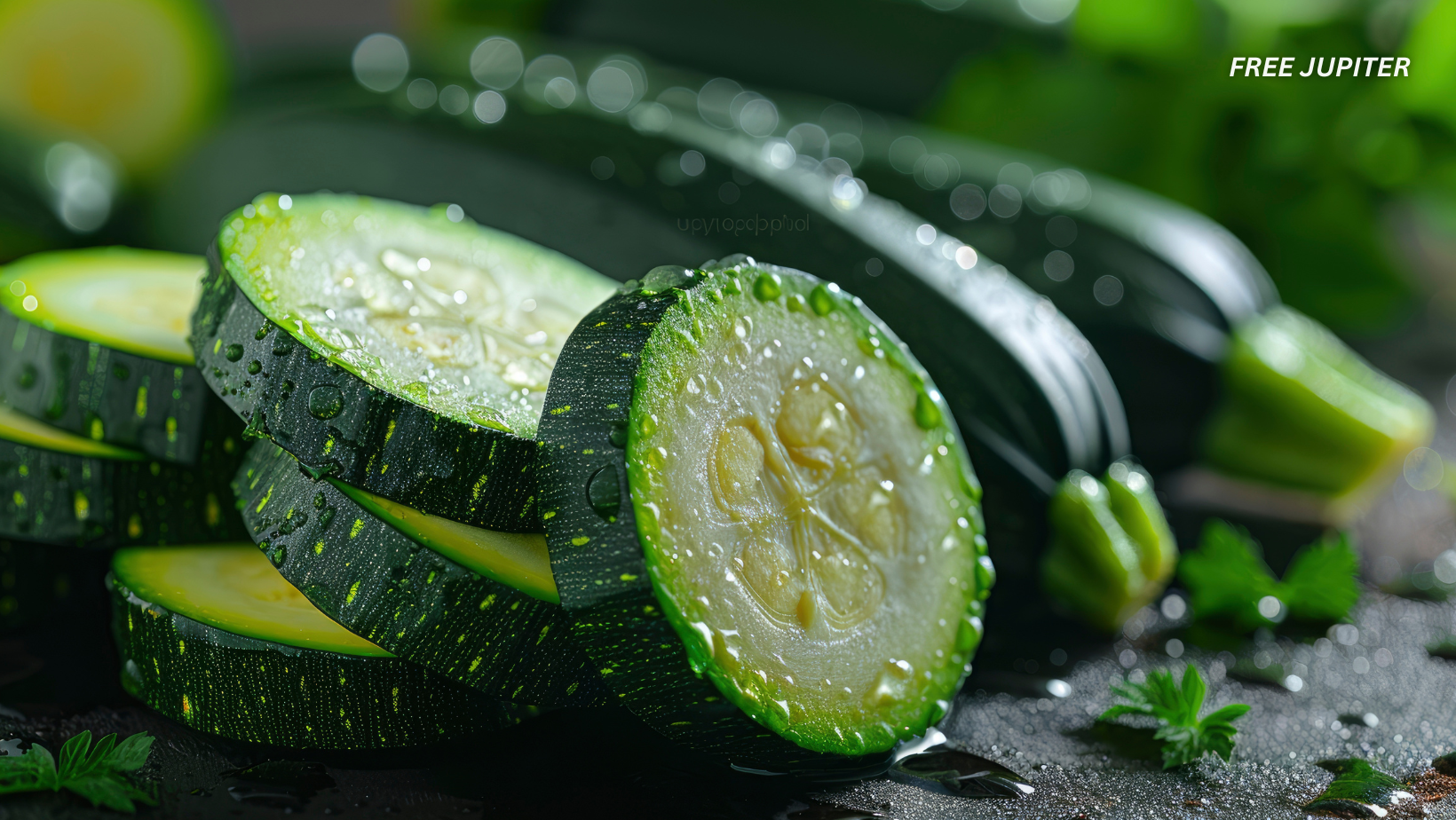Zucchini might not be the loudest veggie in the produce aisle, but it’s definitely one of the most underrated. You can spiral it into “zoodles,” grate it into muffins, grill it, bake it, or just slice and toss it into your favorite dish. It’s easy to cook with and incredibly forgiving—and as it turns out, your body kind of loves it.
But what really happens if you start eating zucchini on a regular basis? Let’s peel back the layers of this mild-mannered squash and see what’s going on behind the scenes.
1. It Helps Keep Things Moving
Let’s talk digestion—because zucchini is a quiet hero when it comes to keeping your gut happy. It’s got a decent amount of fiber, especially if you leave the skin on. That fiber adds bulk to your stool, making your trips to the bathroom a lot more predictable (and comfortable). Plus, all that water in zucchini helps keep things soft and smooth—yes, we’re still talking about digestion.
It even feeds your friendly gut bacteria, which are basically your microscopic health cheerleaders.
2. It’s Practically a Hydration Snack
Zucchini is about 95% water—so eating it is kind of like sipping from a vegetable. This makes it perfect for hot days, or any time you’re trying to stay hydrated without chugging another glass of water. Proper hydration keeps your energy up, your skin clearer, and your body temperature in check.
So, while zucchini might not replace your water bottle, it’s definitely helping you out in the background.
Read more: New Study Suggests That Water Isn’t the Most Hydrating Drink
3. It Packs Antioxidant Power
Your body faces daily wear and tear—not just from life itself, but from tiny unstable molecules called free radicals. These guys can damage your cells over time, and when there are too many of them, it can lead to something called oxidative stress (which is not great).
Zucchini is rich in antioxidants like vitamin C and beta carotene, which help neutralize free radicals. That means less inflammation, better immune function, and possibly even a lower risk of chronic diseases like heart problems and certain cancers.
4. It’s Basically a Love Letter to Your Heart
Zucchini may be mild in flavor, but when it comes to heart health, it’s kind of a big deal. Thanks to its high potassium and low sodium content, it helps keep your blood pressure in check. Potassium works behind the scenes to balance out sodium, easing tension in blood vessels and helping your heart stay in rhythm.
And remember that fiber we mentioned earlier? It’s also great for lowering cholesterol. Two points for zucchini.
Read more: Even After You Lose Weight, Your Fat Cells Retain A Special Memory Of Being Obese
5. Your Eyes Might Thank You Too
The antioxidants in zucchini don’t stop at your immune system—they also support your vision. Zucchini contains lutein and zeaxanthin, two mouthfuls of nutrients that play a huge role in eye health. They gather in the retina and act as a natural shield, protecting your eyes from damage caused by too much light (especially that annoying blue light from screens).
Regular zucchini eaters might be giving their future selves better odds against age-related vision issues. So yes—your eyeballs are quietly applauding you.
6. It’s Low in Calories But Nutrient-Rich
One small zucchini (about 100 grams) delivers a surprising mix of important nutrients with very few calories. Here’s what you’re getting:
- Calories: 19
- Carbs: 3g
- Fiber: 1g
- Sugar: 2.5g
- Protein: 1g
- Fat: Almost none
- Vitamin C: 20% of what you need in a day
- Vitamin B6: 10%
- Potassium: 6%
All of that in a vegetable you can eat raw, cooked, or baked into dessert. Impressive, right?
7. Most People Can Eat It Safely—But a Few Should Be Cautious
For the vast majority of folks, zucchini is a very safe food. But there are a couple of things to watch for:
- Food allergies: Zucchini is part of the same plant family as pumpkins, cucumbers, and other squashes. If you’re allergic to any of those, proceed with caution.
- Bitterness alert: Sometimes zucchini can taste bitter, especially if it’s been sitting out too long or grown in poor conditions. This bitter taste comes from a compound called cucurbitacin, which in rare cases can cause stomach upset. If it tastes off, don’t eat it.
- Medication interactions: Zucchini contains potassium, which is normally a good thing. But if you’re taking potassium-sparing medications or certain diuretics, it might be wise to check in with your doctor before doubling up.
8. Fun, Easy, and Delicious Ways to Eat More Zucchini
Tired of salads? Zucchini is here to make vegetables exciting again. Try these:
- Zoodles (Zucchini Noodles): Spiralize it and toss with sauce—like pasta, but lighter.
- Grilled or Roasted: Slice, season, and cook until golden for a savory side dish.
- Zucchini Bread or Muffins: Adds moisture and nutrients to baked treats. Bonus: kids won’t even notice it’s in there.
- Stuffed Zucchini Boats: Cut in half, scoop out the middle, stuff with meat, veggies, or grains, and bake.
Read more: What Happens to Your Body When You Eat Chocolate Every Day
So, Should You Eat Zucchini More Often?
In a word: yes. But let’s unpack why this easygoing green veggie deserves more than just an occasional cameo on your dinner plate.
Zucchini may not have the superstar status of kale or avocado, but it’s a quiet overachiever in the nutrition world. When you eat it regularly, you’re not just filling your belly—you’re giving your body a little health upgrade each time. It checks off multiple wellness boxes in one swoop: gut health, hydration, heart function, vision support, inflammation control—you name it. And all of that comes wrapped in a low-calorie, mild-tasting package that adapts to whatever flavor profile you’re craving.
Even better? Zucchini is incredibly easy to sneak into your meals. Unlike stronger-tasting vegetables that can overwhelm a dish, zucchini plays well with others. You can shred it into meatballs, stir it into soups, sauté it with garlic, or blend it into smoothies (yes, really). And because it’s naturally low in calories, fat, and sugar, it fits perfectly into almost any kind of eating plan—whether you’re trying to lose weight, reduce carbs, manage blood pressure, or simply eat cleaner.
Plus, it’s budget-friendly and widely available year-round—even though it’s technically a summer squash. You don’t have to shop at a fancy market or wait for it to be in season to get the health benefits. Just grab a few from your local store, give them a rinse, and you’re good to go.
That said, no food is a miracle cure on its own. The real magic comes from balance—pairing zucchini with a variety of colorful fruits, vegetables, lean proteins, and whole grains. Think of it as one small but mighty part of your overall wellness puzzle. Whether you’re blending it into a smoothie or piling it on your plate next to grilled chicken, your body will thank you for making it a regular guest at your table.
So yes, go ahead—eat more zucchini. Your gut, your heart, and maybe even your taste buds will be better for it.










